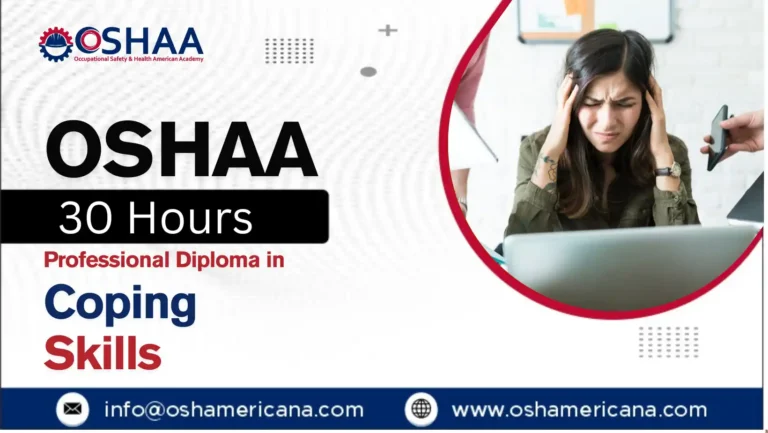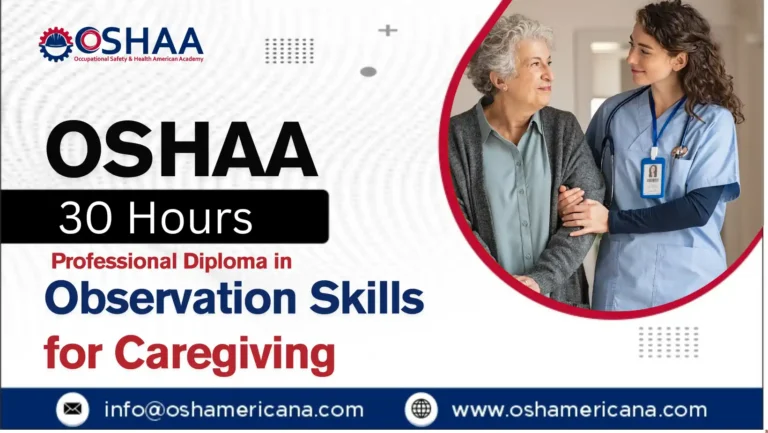Alcohol dependence is a serious public health issue, affecting individuals, families, and communities. Effective treatment requires a comprehensive understanding of evidence-based approaches that support recovery and long-term well-being. The OSHAA 30-Hours Diploma in Alcohol Dependence: Evidence-Based Treatment provides a structured and in-depth learning experience for professionals and individuals seeking to expand their knowledge in alcohol dependency treatment.
Alcohol dependence is a chronic condition characterised by a strong craving for alcohol, loss of control over drinking, withdrawal symptoms, and an increased tolerance. It affects both physical and mental health, often leading to severe social and occupational consequences. Addressing alcohol dependence requires a combination of medical, psychological, and social interventions that are backed by research and best practices.
This diploma offers a comprehensive curriculum focusing on the latest evidence-based strategies for assessing, treating, and supporting individuals affected by alcohol dependence. Participants will explore key topics such as the neurobiology of addiction, behavioural therapies, pharmacological interventions, relapse prevention, and holistic treatment approaches.
Whether you are looking to advance your career or expand your expertise in alcohol dependency treatment, this course provides the essential knowledge and skills to make a meaningful impact.
OSHAA 30-Hours Diploma in Alcohol Dependence: Evidence-Based Treatment
Study Units
Learning Outcomes
- Introduction to Alcohol Dependence and Addiction Science (4 Hours)
- Understand the definition and classification of alcohol dependence.
- Explore the social, psychological, and biological factors contributing to alcohol addiction.
- Recognise the impact of alcohol dependence on individuals, families, and society.
- Identify key evidence-based approaches to alcohol treatment and recovery.
- Neurobiology and Psychological Aspects of Alcohol Addiction (4 Hours)
- Explain the effects of alcohol on brain chemistry and neurological function.
- Analyse the role of dopamine and reward pathways in addiction.
- Understand psychological theories of addiction and dependency.
- Discuss emotional, cognitive, and behavioural consequences of alcohol dependence.
- Screening, Assessment, and Diagnosis of Alcohol Dependence (4 Hours)
- Learn the criteria for diagnosing alcohol dependence and related disorders.
- Explore screening tools and assessment techniques used in clinical practice.
- Understand the importance of patient history, interviews, and observational methods.
- Identify risk factors for alcohol misuse and dependence.
- Pharmacological Treatments and Medical Management (3 Hours)
- Examine commonly prescribed medications for alcohol dependence.
- Understand the role of medication-assisted treatment (MAT) in recovery.
- Identify withdrawal symptoms and medical interventions for detoxification.
- Discuss potential side effects and contraindications of pharmacological treatments.
- Behavioural and Psychosocial Interventions (4 Hours)
- Explore cognitive-behavioural therapy (CBT) and motivational interviewing (MI) techniques.
- Understand the role of family therapy and support networks in recovery.
- Analyse the effectiveness of group therapy and peer support programmes.
- Develop strategies for addressing triggers and preventing relapse.
- Dual Diagnosis and Co-Occurring Mental Health Disorders (3 Hours)
- Identify common mental health disorders associated with alcohol dependence.
- Understand the challenges of treating dual diagnosis patients.
- Explore integrated treatment approaches for co-occurring disorders.
- Recognise the importance of personalised treatment plans in complex cases.
- Harm Reduction, Relapse Prevention, and Aftercare Planning (4 Hours)
- Learn strategies for minimising harm related to alcohol misuse.
- Develop relapse prevention plans tailored to individual needs.
- Understand the importance of aftercare and long-term recovery support.
- Explore community resources and rehabilitation programmes.
- Legal, Ethical, and Safeguarding Considerations in Alcohol Treatment (4 Hours)
- Understand the legal responsibilities of professionals in addiction treatment.
- Explore ethical issues related to confidentiality and informed consent.
- Identify safeguarding concerns and responsibilities in alcohol treatment.
- Learn about policies and regulations governing alcohol dependence services.
- Comprehensive Understanding of Alcohol Dependence – Gain in-depth knowledge of addiction science, including psychological, neurological, and social factors contributing to alcohol dependence.
- Evidence-Based Treatment Approaches – Learn about the latest research-backed interventions, including pharmacological treatments, behavioural therapies, and harm reduction strategies.
- Enhanced Professional Skills – Develop practical skills in assessment, diagnosis, and treatment planning, equipping you to work effectively with individuals struggling with alcohol dependence.
- Improved Patient Outcomes – Apply best practices to support recovery, prevent relapse, and provide ongoing aftercare for individuals affected by alcohol misuse.
- Expertise in Dual Diagnosis Management – Understand how to address co-occurring mental health conditions, ensuring a holistic approach to addiction treatment.
- Legal and Ethical Awareness – Gain knowledge of safeguarding responsibilities, ethical considerations, and legal frameworks related to alcohol treatment and patient care.
- Career Advancement Opportunities – Enhance your credentials and career prospects in addiction counselling, healthcare, mental health services, and community support roles.
- Flexible Learning Experience – Complete the course at your own pace while gaining practical and theoretical expertise that can be applied in real-world settings.
- Healthcare Professionals – Doctors, nurses, and medical practitioners looking to expand their knowledge of alcohol dependence treatment and patient care.
- Mental Health Practitioners – Psychologists, counsellors, and therapists working with individuals experiencing alcohol misuse and co-occurring mental health conditions.
- Addiction and Rehabilitation Specialists – Professionals in substance misuse treatment, detox centres, and rehabilitation programmes seeking evidence-based intervention strategies.
- Social Workers and Community Support Workers – Individuals supporting vulnerable populations affected by alcohol dependence, including those in social care and outreach services.
- Law Enforcement and Criminal Justice Personnel – Officers, probation workers, and legal professionals involved in cases related to alcohol misuse and rehabilitation.
- Educators and Researchers – Academics, trainers, and researchers focusing on addiction science, public health, and behavioural interventions.
- Anyone Interested in Addiction Treatment – Individuals seeking to develop expertise in alcohol dependence treatment, whether for personal knowledge or professional development.







